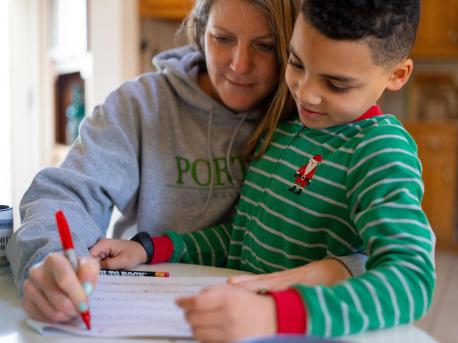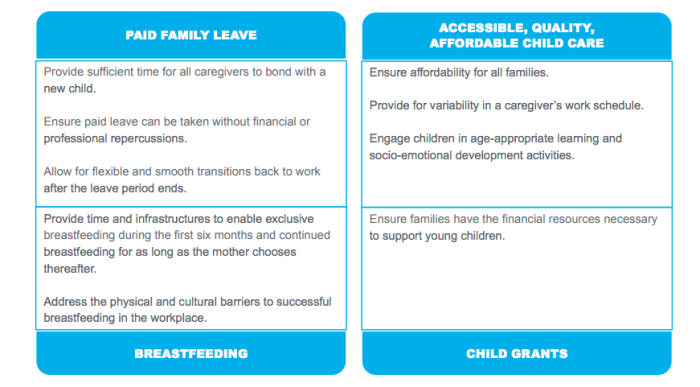
COVID-19 Pandemic Proves Family-Friendly Policies Are a Must
The COVID-19 pandemic has put tremendous pressure on children and parents. Family-friendly policies in the workplace are more important than ever.
The COVID-19 pandemic could drive more than 80 million children globally into household poverty by the end of 2020, according to UNICEF estimates — and that's in addition to the 600 million children already living in poverty around the world. Those figures relate primarily to low- and middle-income countries, but high-income countries like the U.S. are by no means immune. UNICEF, together with the International Labour Organization (ILO), also estimates that up to 19 million children may be pushed into child labor as a result of the global health crisis – reversing progress made in recent years. This has major implications for the supply chains of international companies, including those headquartered in the U.S.
Family-friendly policies give parents the support and flexibility they need to raise healthy, happy children
Family-friendly business policies and practices in the workplace play a vital role in keeping kids out of poverty. They support and enable working parents to reconcile familiy responsibilities and work demands so they can do the most important job of all: raising their children. Family-friendly policies (FFPs) include:
- paid parental leave (maternity and paternity)
- paid sick leave
- breastfeeding support at work
- accessible, affordable, quality child care
- decent wages
- other forms of child benefits provided by governments
In the context of fighting coronavirus, employment and income protection are also essential. These measures are especially important for low-income workers and those in more precarious employment, because typically these employees and workers lack access to many of those benefits, despite the fact that they need them the most.
We know from our research that there are three things that working parents need, which are addressed through these policies and benefits: time, financial resources and services.
This requires action from a range of stakeholders. If we want to redesign the workplace, we need governments, businesses, civil society and parents to come together and put FFPs at the center. This will help create an environment that allows parents to be productive employees and provide for their children to ensure they are able to realize their fullest potential.
With this goal in mind, UNICEF USA hosted a virtual discussion on how businesses are supporting caregivers during COVID-19 and their plans for the future. Speakers representing Johnson & Johnson, Microsoft, Unilever, the Parental Leave Corporate Task Force, the International Finance Corporation, and Zero to Three highlighted what they have learned through their efforts to support parents during COVID-19 and outlined permanent shifts they hope to see post-pandemic.
Staying family-friendly in the coronavirus context
In the absence of national policies in the U.S., companies have taken action to address gaps where possible. COVID-19, says Harsha Jalihal, Unilever’s Vice President of Human Resources for the U.S., has not detracted from the company’s institutional commitments to employees. Rather, the crisis has “amplified those commitments to support our workers and their families throughout the value chain,” starting from the highest levels of leadership. In addition to maintaining pre-existing FFPs, this has also included expanding mental health resources and leveraging innovative financing models to ensure support for all members of Unilever’s global community.
Teresa McDade, Microsoft's Director of Work and Life Benefits, echoed the importance of supporting workers outside of organizational headquarters. She shared the organization’s initial rationale for requiring all U.S. suppliers to provide paid leave to their employees: namely, that if FFPs were important for “the health, well-being and diversity of [Microsoft] employees," then those policies were just as valuable for workers deeper in the supply chain who “are also critical to our success.” This line of thinking, she says, is more relevant and critical than ever in the current context.

Companies that have put in the work over the years to establish strong FFPs found that they were able to adjust and build upon their already strong foundation to fight coronavirus' impact on families. Flavia Miranda, Leader of Total Rewards Strategy and Design at Johnson & Johnson, noted, “In line with our commitments to prioritize the health and well-being of our employees, we acted quickly to introduce new policies and benefits to support employees in balancing their personal and professional responsibilities and prioritize their emotional, mental and physical well-being.”
Looking beyond a U.S. multinational corporate perspective, lessons from abroad point to opportunities for local and smaller businesses interested in addressing child care during the pandemic and beyond. Rudaba Zehra Nasir, Global Lead for Employment and Childcare at the International Finance Corporation’s (IFC) Gender and Economic Inclusion Group, pointed to Artistic Milliners, a denim manufacturer and exporter in Pakistan, as a prime example of a company that has adapted its existing child care center to serve the caregiving needs of essential workers in the community, following guidance included in IFC’s latest publication, Childcare in the COVID-19 Era: A Guide for Employers. Multi-stakeholder child care models are one solution to increase access among small and medium enterprises (SMEs), with similar successful cases also documented in the U.S.
Building back better
Patricia Cole, Senior Director of Federal Policy at Zero to Three, invited attendees to imagine what the domestic fight against COVID-19 would have looked like — especially for the most vulnerable — if national child care support had previously been in place. As stakeholders have increasingly realized the essential value of child care providers, Cole noted that “child- and family-friendly policies must be the foundation of our [COVID-19] recovery,” which includes enacting federal-level legislation. As Ms. Nasir reiterated, “We cannot reopen economies without caring for children and their families, without showing kindness and compassion for caregivers.”

Alex Edmonds Brown holds his son Harley James, born premature, in a private room in the maternity ward of the Royal Devon and Exeter Hospital, in Exeter, Devon, England on February 28, 2018. © UNICEF/UN0204086/Zehbrauskas
Changing the pre-COVID status quo must also include dismantling stereotypes and expanding opportunities for caregivers of all genders to be present for children from their earliest moments. As Carlos Javier-Gil, Global Brand Vice President for Dove Men+Care and co-chair for the Parental Leave Corporate Task Force, put it, one of the missions of the Task Force is “to provide resources for families and dads to experience the transformative effect of child care and the benefits that men-involved child care have for gender equality at home, at work and in society.”
The fight against coronavirus has illuminated positive opportunities for shaping the future of work
Even though fighting coronavirus has presented substantial challenges, it has also illuminated positive opportunities for shaping the future of work. Namely, working cultures must be founded in compassionate relationships between employers and employees, broaden understanding of what working life and employee pools can and should look like, and affirm that holistic employee well-being, including mental health, is mission critical for business success and survival.
COVID-19 has, perhaps most importantly, driven home that FFPs are not "nice to haves." They are matters of economic importance and resilience for families, companies and governments alike. Leading the charge to build back better requires collaboration across sectors to reimagine a future where the needs of every child are put front and center in policies that support working parents in and outside of the workplace.
Additional resources from UNICEF:
- The Intrapreneurship Guide to advance family-friendly practices and policies in your workplace, including in the context of COVID-19
- Guidance for employers on supporting working parents during COVID-19, jointly published by ILO, UN Women, and UNICEF
- Insights on integrating child rights into the garment sector, co-published by UNICEF and Norges Bank Investment Management (NBIM)
- An analysis of what COVID-19 has taught us about the importance of family-friendly policies in the U.S.
Additional resources from speakers:
- IFC’s business case for expanding child care
- The Parental Leave Corporate Task Force’s website for more information on how to get involved in championing parental leave for dads
- Zero to Three’s Think Babies campaign
Other ways to take action:
- Raise awareness of the importance of family-friendly policies on social media using the hashtag #EarlyMomentsMatter
- Donate to support UNICEF’s programs for children and families globally
UNICEF USA’s Child Rights and Business team extends our deepest gratitude to the speakers and panelists for their participation and ongoing partnership for children everywhere.
Top photo: On the morning of March 16, 2020, during the COVID-19 lockdown, 8-year-old second grader Luka works on a math assignment at home in Connecticut, with help from his mother, Sophia. © UNICEF/UNI313395/McIlwaine


